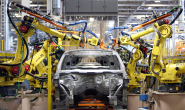Analysis

May 10, 2022
Stellantis Reports Belvidere Outage, Market Expects Chip Shortage Through 2023
Written by David Schollaert
Stellantis, Chrysler’s European parent company, is the latest domestic carmaker to halt production due to the semiconductor shortage, a spokeswoman told Steel Market Update (SMU).
![]() The Auburn Hills, Mich.-based automaker will pause production of some high-demand SUVs the week of May 9. The Belvidere, Ill., assembly plant, which makes the Jeep Cherokee SUV, has seen downtime multiple times this year due to the chip shortage, most recently a two-week outage in early March.
The Auburn Hills, Mich.-based automaker will pause production of some high-demand SUVs the week of May 9. The Belvidere, Ill., assembly plant, which makes the Jeep Cherokee SUV, has seen downtime multiple times this year due to the chip shortage, most recently a two-week outage in early March.
“Stellantis continues to work closely with our suppliers to mitigate the manufacturing impacts caused by the various supply chain issues facing our industry,” she said. “Due to the unprecedented global microchip shortage, production at the Belvidere Assembly Plant will be down the week of May 9.”
All told, US automotive manufacturers have endured major supply chain disruptions for two years now. The lack of semiconductor chips and other components, as well as the global pandemic, has led to production halts, delays, and inventory shortages that have roiled the new car market and boosted used car sales.
And relief from the microchip shortage will not come anytime soon. According to recent market reports, the chip scarcity will carry on through 2023, and possibly bleed into 2024.
Intel’s Pat Gelsinger told CNBC that he now expects the semiconductor industry to suffer supply shortages until 2024. The latest supply crunch is due to a lack of manufacturing equipment.
Late last month, specialized chip tool manufacturers like ASML, Lam Research, Applied Materials, and KLA warned their clients that critical equipment may not be shipped for another 18 months.
Oliver Zipse, BMW’s CEO told Swiss publication Neue Zuercher Zeitung that the global auto industry is still in the “height of the chip shortage”, adding that he doesn’t expect to start seeing improvements until next year. “We will still have to deal with a fundamental shortage in 2023,” he added.
Mary Barra, General Motors’ CEO, and Jim Farley, Ford’s top executive, have both said that the semiconductor problem will persist into next year. Volkswagen Group’s CFO Arno Antlitz doesn’t expect chip supplies to normalize until 2024, he said in an interview with German publication Boersen-Zeitung. By then the market will have a “structural undersupply” of chips, he said.
Though no other North American automaker reported any current or planned downtime to SMU this week, the impact of the microchip shortage continues to force carmakers to shift and adjust production.
Ford told Automotive News last week that an issue with a semiconductor module on a windshield wiper hindered sorely needed production of its profitable Expedition and Lincoln Navigator SUVs.
The company has about 53,000 vehicles sitting around waiting for chips or related components, the report said.
Aptiv PLC, a Dublin-based microchip manufacturer, stopped shipping chips and some parts from its Shanghai plant over the weekend. The facility supplies Tesla, GM, Ford, Stellantis, and Toyota with chips and automotive technology parts. It wasn’t clear what kind of impact the distribution setback would have.
Car manufacturers wouldn’t comment on specifics or individual suppliers but said they were continuing to monitor the situation in China.
Honda didn’t confirm any official disruptions, but said its North American operations would be adjusting production based on parts supply availability this week. Nissan, Subaru, and Daimler all confirmed to SMU that there are no current or foreseen production stoppages.
This is not good news for the steel industry either. Steel demand from the auto industry is unlikely to come roaring back in the second half of this year as initially predicted. For each vehicle that does not get built, roughly one ton of steel is not consumed. The ripple effects of the microchip shortage might be felt for a while.
By David Schollaert, David@SteelMarketUpdate.com






